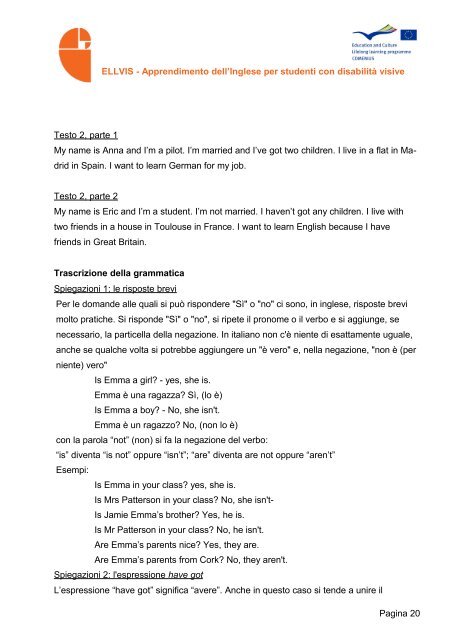ELLVIS Corso d'inglese Manuale dell'Insegnante - ELLVIS - Allvip
ELLVIS Corso d'inglese Manuale dell'Insegnante - ELLVIS - Allvip
ELLVIS Corso d'inglese Manuale dell'Insegnante - ELLVIS - Allvip
You also want an ePaper? Increase the reach of your titles
YUMPU automatically turns print PDFs into web optimized ePapers that Google loves.
Testo 2, parte 1<br />
<strong>ELLVIS</strong> - Apprendimento dell’Inglese per studenti con disabilità visive<br />
My name is Anna and I’m a pilot. I’m married and I’ve got two children. I live in a flat in Ma<br />
drid in Spain. I want to learn German for my job.<br />
Testo 2, parte 2<br />
My name is Eric and I’m a student. I’m not married. I haven’t got any children. I live with<br />
two friends in a house in Toulouse in France. I want to learn English because I have<br />
friends in Great Britain.<br />
Trascrizione della grammatica<br />
Spiegazioni 1: le risposte brevi<br />
Per le domande alle quali si può rispondere "Sì" o "no" ci sono, in inglese, risposte brevi<br />
molto pratiche. Si risponde "Sì" o "no", si ripete il pronome o il verbo e si aggiunge, se<br />
necessario, la particella della negazione. In italiano non c'è niente di esattamente uguale,<br />
anche se qualche volta si potrebbe aggiungere un "è vero" e, nella negazione, "non è (per<br />
niente) vero"<br />
Is Emma a girl? - yes, she is.<br />
Emma è una ragazza? Sì, (lo è)<br />
Is Emma a boy? - No, she isn't.<br />
Emma è un ragazzo? No, (non lo è)<br />
con la parola “not” (non) si fa la negazione del verbo:<br />
“is” diventa “is not” oppure “isn’t”; “are” diventa are not oppure “aren’t”<br />
Esempi:<br />
Is Emma in your class? yes, she is.<br />
Is Mrs Patterson in your class? No, she isn't-<br />
Is Jamie Emma’s brother? Yes, he is.<br />
Is Mr Patterson in your class? No, he isn't.<br />
Are Emma’s parents nice? Yes, they are.<br />
Are Emma’s parents from Cork? No, they aren't.<br />
Spiegazioni 2: l'espressione have got<br />
L’espressione “have got” significa “avere”. Anche in questo caso si tende a unire il<br />
Pagina 20


